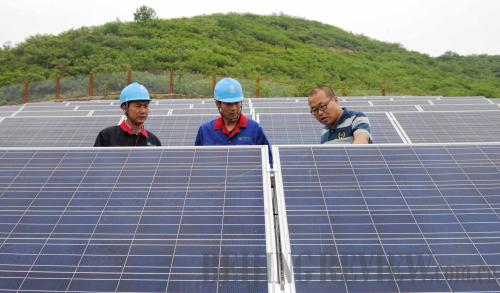|
 |
|
PRIVATE POWER PLANT: Zhu Fengxi, a resident in Chengde, north China's Hebei Province, learns safety tips from staff at a local power company. Zhu installed 180 solar panels inside his farm to generate power at home (WANG XIAO) |
China-Swiss FTA
China and Switzerland signed a free trade agreement (FTA) in Beijing on July 6, capping over two years of negotiations. It is the first free trade pact inked between China and a country in continental Europe.
Once the FTA goes into effect, as much as 99.7 percent of Chinese exports to Switzerland will be immediately exempted from tariffs, while 84.2 percent of Swiss exports to China will eventually receive zero tariff treatment.
The deal is also expected to set new rules in the areas of environment, labor, intellectual property and government procurement, said Chinese Minister of Commerce Gao Hucheng.
Schneider-Ammann, head of the Swiss Federal Department of Economic Affairs, said the FTA will inject vitality into bilateral economic and trade ties.
Under the deal, Swiss enterprises' access to the Chinese market will be better protected on the basis of existing laws, said Schneider-Ammann.
China is Switzerland's largest trading partner in Asia, while Switzerland is China's eighth largest trading partner in Europe, according to China's Ministry of Commerce.
Lackluster Trade
China's exports took a tumble in June, putting pressure on growth of the world's second largest economy.
Exports dropped 3.1 percent year on year in June to $174.32 billion, while imports went down 0.7 percent from a year earlier to $147.19 billion, said the General Administration of Customs (GAC) on July 10. Total foreign trade in June declined 2 percent year on year to $321.51 billion.
GAC spokesman Zheng Yuesheng attributed the slump in foreign trade mainly to weak global demand, a rising yuan, higher labor costs, various trade frictions and faltering domestic demand.
In the first six months, China's foreign trade, with 8.6-percent growth year on year, recorded the best performance among the world's major economies despite the fact that it is slowing down, he said.
Inflation Rebound
China's consumer price index (CPI), a main gauge of inflation, grew by 2.7 percent year on year in June, but analysts say the acceleration indicates little inflationary pressure.
June's CPI was up from 2.1 percent in May, but still well below the government's full-year target of 3.5 percent.
The National Bureau of Statistics attributed the acceleration to a 4.9-percent rise in food prices, as well as the base effect.
"From a global perspective, 2.7-percent inflation growth will not add too much pressure to the economy. Due to insufficient domestic and foreign demand, we expect mild inflation this year, probably within 2.5 percent," said Zhang Bin, a researcher with the Chinese Academy of Social Sciences.
| 